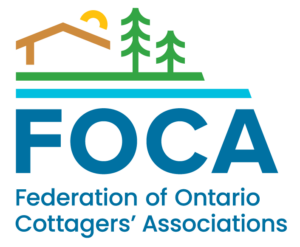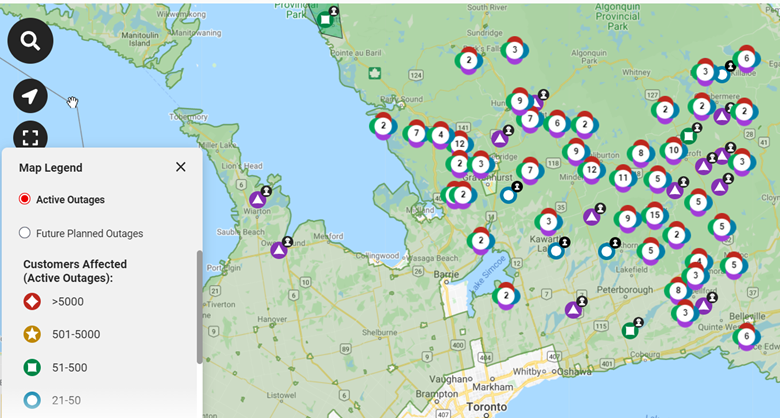
We must all be prepared for power outages or other emergencies in remote areas, and step up to help neighbours in times of trouble.

Cottage country areas tend to be remote, rocky, and difficult to service. Rural residents must be resilient and prepared for service interruptions.

January 2026 – check out this online partner resource: Caring for Trees after Ice Storms (Forests Canada – source of the image at the side) for safety, assessing damage, pruning guidelines, and other considerations.
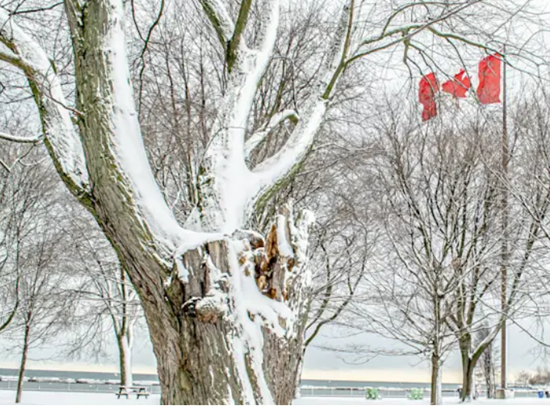
December 2025 – 2025 – For many years, FOCA has asked our emergency management partners for a way to ensure seasonal residents could receive alerts about conditions at their distant properties – and now it is here! Canada has a new “alert” app and you can sign up for notifications about any location you choose (instead of just receiving “push” notifications if you are standing in an area under alert). This means you can get alerts about the cottage while you are at work, in the city, travelling, etc. Check out Alertable and download to your iDevice or Smartphone.
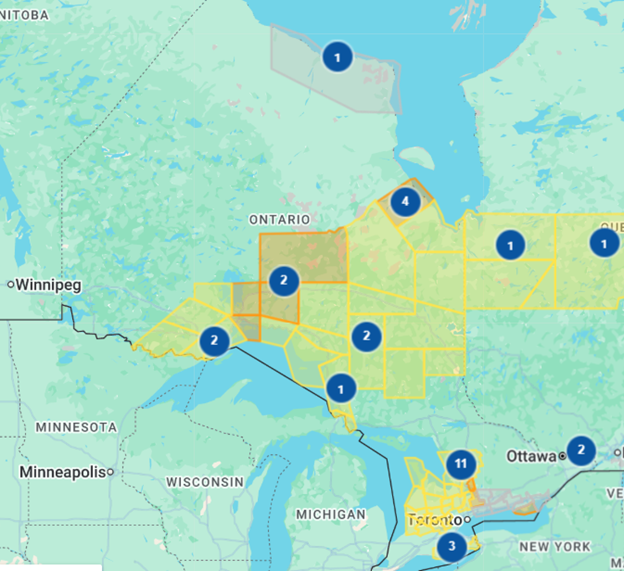

Dig in to these topics through links below and on additional FOCA webpages:
- Cardiac safe cottages – immediately below
- Emergency response: be prepared – copy our “Locator Template”!
- High Water & Flood events in cottage country
- Police Services and Crime Prevention tips
- Boating Safety
- Ice Safety
The safety and well-being of rural waterfront residents is of significant importance to FOCA and our member associations, and to all of us who spend time in the out of doors – often many miles from local services. Given the independent and self-sufficient nature of rural living, it is vital that we are prepared in the event of an emergency, and able to quickly and accurately relay the required information to emergency service providers.
FOCA advocates on priority rural issues including:
- expanded rural and northern access to reliable broadband and cell service for residents and emergency responders
- being prepared for fire, extreme weather and power outages- read more below about emergency preparedness
Hydro One Storm Centre – Hydro One customers can keep track of planned and unplanned electrical outages: http://www.hydroone.com/stormcenter3/.
NOTE: To report an outage call 1-800-434-1235
FOCA webinar:
Creating Cardiac Safe Cottages & Communities
- webinar link to share with everyone: https://youtu.be/8-3ZVij7rqM
- download the slides & resource links (PDF, 13 MB)
- visit the FOCA Benefits webpage, and login for access to the member offer details from Action First Aid, for AEDs and related training!
MEMBERS: Please share this information widely with your cottage community!
This public webinar was sponsored by our corporate partners at Action First Aid, who provide a FOCA member discount on select AEDs, and also provide first aid training to community groups.
During the May 2024 seminar, speaker Deb Hennig of Action First Aid mentioned a new Private Member’s Bill (C-389) that has had first reading in Parliament. The Bill proposes to eliminate tax on the purchase of automated external defibrillators, kits containing them, and pads and accessories designed to be used with them; Deb encouraged interested FOCA members to write their own MP in support of this idea. If you do write, please copy FOCA (communications@foca.on.ca) on your letters.
Emergency response: be Prepared!
The safety and well-being of rural waterfront residents is of significant importance to FOCA and our member associations, and to all of us who spend time in the out of doors – often many miles from local services. Given the independent and self-sufficient nature of rural living, it is vital that we are prepared in the event of an emergency, and able to quickly and accurately relay the required information to emergency service providers.
Top Tip:
FOCA recommends that each waterfront home have a handy and visible list of emergency phone numbers posted somewhere prominent, near a telephone if possible. Create your own call list, or adapt this handy example from FOCA to put all the relevant information for your location in one place.
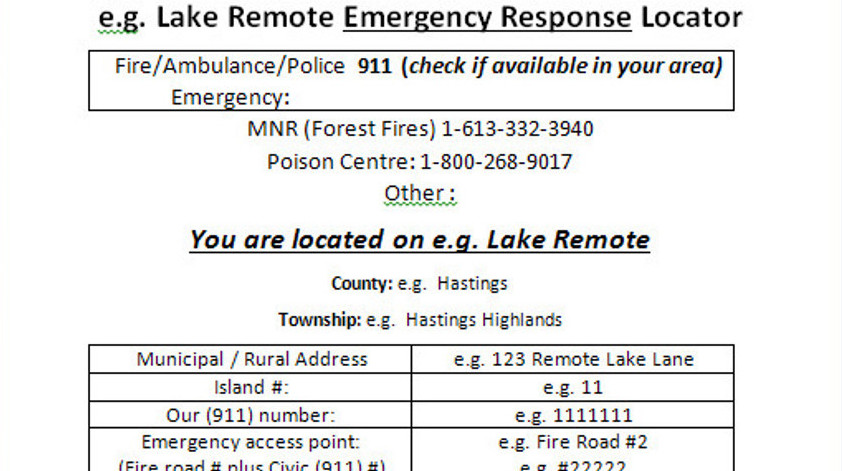
This will aid in directing first responders to your location – critical information that may save a life, and that (in a panic) may be hard to translate or describe – especially if a guest, or others less familiar with your location, are making the call. Help our first responders to get to you when you need them most.
Earlier Cardiac Safety Webinar:
April 2021 webinar: FOCA and our partners at Action First Aid hosted a one hour “lunch and learn” webinar about Automated External Defibrillators (AEDs) and how to create a cardiac safe cottage community.
The digital recording is available to all FOCA members below.
Need help with your login? Contact us! Not yet a Member? Find out why you should be!

January 2021 – A new app has FOCA buzzing! What3Words works globally to help you tell emergency responders exactly where you are, by converting complex latitude/longitude combinations into three unique word sequences.
(Proviso: you still need a bar of internet service in the moment, for the app to generate a new location code.) Download on your mobile device, or check out the functionality from your computer now: details about What3Words are online here.
Residents of the District of Muskoka can now receive automated notifications of emergencies affecting their home or cottage though #AlertMuskoka, and the Voyent Alert! app.
FOCA 2013 Fall Meeting with Bob Sandford (Climate Change)
November 2, 2013 – International Centre, Toronto with Featured speaker: Bob Sandford, “Water Woes: Higher Highs and Lower Lows.”
FOCA was very proud to invite freshwater expert Bob Sandford to speak about climate change, and what waterfront property owners need to know about extreme weather patterns and preparedness. Bob is the EPCOR Chair of the Canadian Partnership Initiative in support of the United Nations “Water for Life” Decade. Special thanks go to our generous event sponsors, Yamaha Canada and the Insurance Bureau of Canada.
When FOCA interviewed Sandford about what a changing climate situation means for our waterfront communities, he answered:
“If you have a house on a lake or river in Canada, you are going to have a ringside seat to observe and measure these changes, which we are only beginning to anticipate and do not yet fully understand.” ~ Bob Sandford, 2013
Read FOCA’s full interview with Bob Sandford, published online by Water Canada in 2013.
~
Members may watch the full 45 minute video presentation below by Bob Sandford at the 2013 FOCA Fall Seminar. Need help with your login? Contact us! Not yet a Member? Find out why you should be!
You're missing members-only content!
The following video resource is only available to members of our Member Associations & current Friends of FOCA (our annual supporters).
If you are already registered on the FOCA website, please login below with your Username and Password.
Need help with your login? Contact us for assistance during business hours. Not yet a Member Association? Find out why you should be!

Please note: the following is archival material, and some links to third-party resources may no longer be active.
August 23, 2023 – Canada’s emergency alert system has been busy with wildfires and extreme weather. Here’s how it works. (CBC News) – some experts say the system works well for weather, but could be better
In 2020, FOCA wrote the Attorney General (AG) about Ontario’s response to northern emergencies, following a coroner’s inquest into the 2013 fatal boating accident and 911 response at Lake Wanapitei.
The AG responded in January 2021, citing a commitment to ensure safety and well-being in Ontario communities, but delays due to COVID 19 for reporting on next steps to support the modernization of the 911 system and emergency communications service delivery in Ontario.
- Read the AG’s response letter, Jan.2021 (download PDF, 2 pages)
- Read FOCA’s Oct.2020 email to the AG (PDF, 1 page)
- Read MPP Gélinas’ Oct.2020 letter to the AG (PDF, 1 page)
- Read a summary of the earlier events, Coroner’s inquest and follow up prior to 2020 (PDF, 2 pages)
August 2017 – tornadoes and other extreme weather in cottage country earlier this month prompt FOCA to remind you to make a plan for your family at home and at the cottage, prepare emergency kits, and sign up for alerts in your area. Get details on all these important steps, from Emergency Management Ontario.
July 2017 – Parry Sound Township reviews 911 dispatch process, after 2016 fire response. Read the article here. (ParrySound.com)
February 2017 – Coroner’s inquest called into fatal boating accident / 911 response.
- Download FOCA’s related letter here (PDF, 1 page)
January 2016 – an update about emergency response in cottage country: According to the OPP (1-888-310-1122), anywhere in the Province of Ontario you can dial 911 for any EMERGENCY situation, whenever police, fire or ambulance assistance is required immediately. OPP is the default responder to 911 calls (in areas where OPP provides policing) and will attend the emergency, or will ensure the appropriate emergency agency (e.g. ambulance or fire) attends. Note that unless you are calling on a landline, a caller will need to be able to provide not only the nature of their emergency, but also their location. Calls made via cell phone or VOIP will not automatically provide OPP with your location. GPS coordinates are helpful, and if possible, practical directions to your location is important especially if your location is remote or hard to find.
FOCA asks questions about community emergency preparedness:
July 2016: According to the Ontario Association of Emergency Managers (OAEM) there are significant deficiencies in the Province’s approach to Community Emergency Response. The Office of the Fire Marshal and Emergency Management (OFMEM) reported that in 2015, 32% of Ontario municipalities were non-compliant with the current Ontario legislation and regulations for emergency management.
Starting in 2001, the plan was to bring in three levels of emergency management programs, an essential level, and enhanced level, and a comprehensive level. Fifteen years later, the province is still trying to get a grasp of what should be in the essential level. The OAEM describes some of the problems with the current approach:
- the legislation and the regulations include many inconsistencies, useless actions, and poorly defined requirements
- no clear definition of what “public education” includes
- there is no indication of when and how CEMCs should use their list of critical infrastructure emergency phone numbers
- the training requirements are very stringent and must follow the EMO curriculum to the letter, and there is no accommodation for the very different structures and capacities e.g. between small rural communities compared to large urban ones
As a large group of property owners, FOCA finds this state of affairs alarming.
FOCA recommends that each of our associations talk to their municipality about local emergency preparedness, and advise their members to take steps to safeguard their own families and their homes.
Under the Emergency Management & Civil Protection Act (EMCPA), every municipality must have a designated Community Emergency Management Coordinator (CEMC). CEMC contact information can be gained by contacting your municipal office.
 Many communities do have fine examples of being well organized and communicating effectively. Here’s one example of a public education piece about personal preparedness: BE PREPARED Grey Bruce Huron (PDF, 36 Pages)
Many communities do have fine examples of being well organized and communicating effectively. Here’s one example of a public education piece about personal preparedness: BE PREPARED Grey Bruce Huron (PDF, 36 Pages)
More About Emergency Preparedness:
Read this blog from Conservation Ontario, about flood risks and preparedness: “Flooding Happens, it’s only a matter of time” (2013)
_____
After flooding in cottage country in Spring 2013, FOCA asked questions of Emergency Management Ontario (EMO) and others, about community preparedness.
EMO’s response to FOCA follows:
May 2013, Emergency Response in Ontario: Dear Mr. Rees: Thank you for your questions. It is encouraging to hear that your organization is being proactive on flood mitigation for its members. Responses to your specific EMO questions are as follows:
FOCA: Are municipalities required to have a designated emergency contact?
EMO: Yes. Under the Emergency Management & Civil Protection Act (EMCPA), every municipality must have a designated Community Emergency Management Coordinator (CEMC). CEMC contact information can be gained by contacting the respective municipal office.
FOCA: Are they required to have an emergency response plan?
EMO: Yes. The EMCPA states that each municipality must have an Emergency Response Plan (ERP).
FOCA: Is there any minimum content for such a plan?
EMO: The ERP, as a minimum, must include roles and responsibilities of the Municipal Emergency Control Group (MEOCG), and procedures for contacting each member of the (MEOCG). EMO also encourages the inclusion of an Emergency Information Plan, Telecommunications Plan, an Evacuation Plan and a Resource Listing, among other things.
FOCA: Are there requirements for testing local emergency response plans?
EMO: Yes. Under the EMCPA, each municipality is required to test their ERP through an exercise every year. The exercise should focus on a hazard that has been identified as a risk by the municipality. EMO often provides advice and assistance in the conduct of these exercises.
FOCA: Who is responsible for vetting or reviewing emergency response plans?
EMO: It is up to the municipality’s Emergency Management Program Committee to ensure the ERP meets the needs of the municipality. The ERP is then approved and adopted by by-law through council. EMO ensures that the plan exists, meets the requirements of the EMCPA as described above, and is reviewed annually.
A final thought to share with your municipality about personal emergency preparedness:
Allan Bonner shared his perspective on the state of municipal emergency response plans in 2015: “When I searched for the Cape Breton emergency plan I found a very comprehensive and long plan, that happens to be very old and, I think, a bit off the mark. What I did find – which is good – is a 72 hour plan and some personal preparedness information on Cape Breton’s website, and that’s great. To me that’s what should be front and center; no citizen cares about the legal authority by which municipalities manage the plan, who reports to whom, jargon, acronyms etc. They want to know what should I do in the event of an emergency…” (Excerpt from: CBC Mainstreet New Brunswick)
September 2015 – More from Allan Bonner about Municipal Emergency Plans (from CHCH Face off) Are cities prepared for emergencies? Do our cities have the answers?
Note: Allan Bonner is an renowned leadership coach and communications consultant with considerable experience in Risk, Disaster and Crisis Management. In addition to his experience with corporate and government leaders worldwide, he is also the author of 11 books on business. Learn more: http://allanbonner.com/about-allan_bonner/
